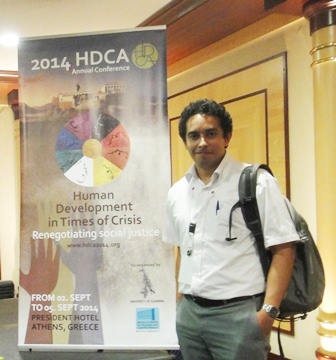Rethinking Human Development and Crisis: JICA Research Fellow Makes a Presentation at an International Conference on Human Development
2014.10.07
From September 2 to 5, JICA-RI Research Fellow Oscar Gomez took part in the annual conference of the Human Development and Capability Association (HDCA), entitled “Human Development in Times of Crisis,” which was held in Athens, Greece.
The HDCA is an academic society with members from over 70 countries and regions, which aims to share research and knowledge on human development and the capability approach, and to relate them to policy arena. This conference took the view that we are currently facing a “times of crisis” where social inequalities are aggravated, social justice is undermined and nationalist xenophobia and tendencies toward racism are reinforced. Given that knowledge and interest concerning human development is especially important in times of crisis, the conference focused in particular on the causes of social inequality, of both social exclusion and inclusion, and the impacts of education and social policy.

Gomez Research Fellow
In a session on the theme of operationalizing the capability approach, Gomez gave a presentation entitled “Human development at the emergency room? Checking the toolbox before next crisis.” He started by pointing out how despite of overall progress in reducing poverty in developing countries as well as the number of conflicts, responses to new crises, such as financial, food crises, and pandemics remain a pervasive source of concern. Notwithstanding efforts to do otherwise, the international humanitarian system has hitherto been pressured to function driven by shocks, instead of identifying needs and vulnerabilities before crisis occur. The latter is a task closer to the doings of the development community and, indeed, the boundaries between humanitarianism and development seem to be becoming less clear. In these circumstances, he noted the importance of rethinking crisis from a perspective of human development.
What can human development idea and approach can tell us about crisis? Gomez highlighted the following four points. Firstly, it has to be recognized that human development is not originally intended to deal with crisis, and thus it has to be complemented with ideas and models closer to human security, such as those of conflict or disaster studies. Secondly, assessments and measurement experiences accumulated through human development studies can be used to assess responses to crises, their impacts and their root causes with consideration of the diversity of the people in society. Thirdly, one key issue in need of attention about crises is the balance between agency and paternalism. More specifically, it is not always clear at what stage in the process from disaster relief to recovery-reconstruction the protector should pass ownership of the process to the affected population. Conversely, at the prevention stage, it is also unclear to what extent the protector can determine preventive measures unilaterally. Related discussions through human development studies face similar difficulties and so it is not clear what the contribution can be in this sense. Finally, a common language has to be shared among the diverse actors involved in crises management, including development practitioners, in order to achieve coordination and cooperation. The usefulness of human development in this sense may be limited and thus, it should be complemented with ideas such as human security and human rights.
In his presentation, Gomez stressed that both practitioners and scholars willing to work in crisis may want to engage more proactively with human security and human rights approaches in order to advance human development ideas.

事業事前評価表(地球規模課題対応国際科学技術協力(SATREPS)).国際協力機構 地球環境部 . 防災第一チーム. 1.案件名.国 名: フィリピン共和国.

事業事前評価表(地球規模課題対応国際科学技術協力(SATREPS)).国際協力機構 地球環境部 . 防災第一チーム. 1.案件名.国 名: フィリピン共和国.

事業事前評価表(地球規模課題対応国際科学技術協力(SATREPS)).国際協力機構 地球環境部 . 防災第一チーム. 1.案件名.国 名: フィリピン共和国.

事業事前評価表(地球規模課題対応国際科学技術協力(SATREPS)).国際協力機構 地球環境部 . 防災第一チーム. 1.案件名.国 名: フィリピン共和国.

事業事前評価表(地球規模課題対応国際科学技術協力(SATREPS)).国際協力機構 地球環境部 . 防災第一チーム. 1.案件名.国 名: フィリピン共和国.
scroll